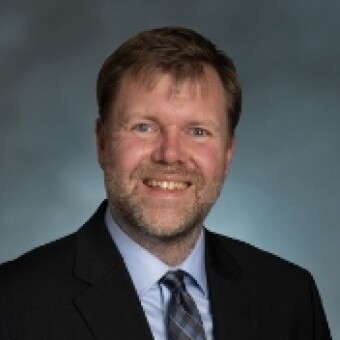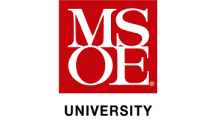delivered directly to you.
delivered directly to you.
Get the Best of MSOE, Online
MSOE’s online machine learning programs are designed to bring the best of our campus—the faculty, stellar curriculum, and trusted reputation—to wherever you live and work. If you live and work in the Milwaukee area, faculty members are always happy to connect with you in person.
This will only take a moment.
MSOE and You: Better Together
Earn your master’s or certificate in machine learning online with MSOE. Complete the form to get a program details sheet for the program of your choosing—Master of Science in Machine Learning or Graduate Certificate in Applied Machine Learning—delivered to your inbox.
MSOE Students Rise to the Challenge
Learn with—and from—your fellow students. You may not be meeting in person on campus, but you will network and connect with your cohort. Through synchronous courses and meaningful course projects, you will connect with professionals who are just as driven and eager to learn as you are.

Applied Machine Learning Certificate Students
The following information on our latest cohort can give you a good idea of the background of the students in the certificate program and the types of professionals you can expect to see in your future cohort.
Undergraduate Majors
- Computer Engineering
- Computer Science
- Electrical Engineering
- Software Engineering
- Economics, Finance
- Math
Graduate Degrees and Areas of Study
- M.S.
- Ph.D.
- Computer Science
- Electrical Engineering
- Computer Engineering
- Engineering Management
Job Titles
- Software Engineer/Developer
- Electrical Engineer
- Data Scientist
- Data Engineer
- Vice President
- Manager
- Firmware Engineer
- Systems Engineer
Professional Levels
- Senior Staff
- Senior Manager
- Vice President
- Senior Staff
- Senior Manager
- Vice President
The best part of the program is that it is designed for a working professional. The synchronous format is great, but if something comes up and I miss a class, I know I can catch up by watching the recording. Professors also offer flexible office hours.
Solve Real-World Problems
MSOE’s online machine learning programs are focused on applying machine learning and AI technologies to solve real-world problems. Projects throughout both programs are integral to helping you develop and implement machine learning solutions. These projects are also designed to allow you to apply your learning to the fields of work that matter to you the most.
Examples include:
- Creating regression models that predict the sale prices of real estate properties
- Engineering new features to improve machine learning model prediction performance
- Applying a pre-trained version of the You Only Look Once (YOLO) model to perform object detection and segmentation with deep neural networks
- Creating machine learning models to distinguish between electrocardiograms indicating healthy patients and those with heart disease
- Applying dimensionality reduction and clustering techniques to explore a large data set of emails
- Analyzing transaction records to identify seasonal patterns in the sales of the products and make suggestions on product inventory levels and in-store displays
Data Science: Spatial Distributions of Real Estate Sales
Technologies used: Pandas, interactive visualization libraries like Bokeh and folium
Machine Learning: Decision Boundaries
Technologies used: supervised learning, linear algebra, Scikit-learn, Numpy
Machine Learning: Detection of Heart Disease from ECGs
Technologies used: Scikit-learn, support vector machines (SVMs), Random Forests
Deep Learning: Japanese Character Recognition
Technologies used: Keras, Tensorflow, dense neural networks (DNNs), convolutional neural networks (CNNs)
At MSOE, We Practice What We Teach
MSOE faculty are experts in applying and consulting on machine learning models for a variety of industries, including software, advertising, audiology and more. Your professors work with and consult on machine learning and AI technologies, and they bring that experience and their expertise directly to you.
Get to know the online machine learning program faculty.

Education and Licensure:
- Professional Engineer, WI License 45011-6
- Executive M.B.A., Business, University of Wisconsin-Milwaukee
- Ph.D., Electrical Engineering, University of Michigan
- M.S.E., Electrical Engineering, University of Michigan
- B.S., Computer Engineering, Milwaukee School of Engineering
- B.S., Electrical Engineering, Milwaukee School of Engineering
Areas of Expertise:
Deep Learning, Audio Processing, Beamforming, Genetic Algorithms, Convex Optimization, Hearing Aids

Prior to joining MSOE, Dr. Nowling worked on applications of machine learning into web services at companies like Red Hat and AdRoll. He teachers courses in data science, machine learning and algorithms.
Education:
- Ph.D., Computer Science & Engineering, University of Notre Dame
- M.S., Computer Science & Engineering, University of Notre Dame
- B.S., Computer Science/Mathematics, Eckerd College
Areas of Expertise:
Computer Science, Machine Learning, Data Science, Genomics, Data Structures and Algorithms, Bioinformatics

Education:
- Ph.D., Computer Science, Vanderbilt University
- M.S., Computer Science, Vanderbilt University
- B.S., Computer Science, Wartburg College
Areas of Expertise:
Machine Learning, Deep Learning, Computational Science, Computer Science, Algorithms, High-Performance Computing, Scrum, Software Engineering

Education:
- Ph.D., Mathematics, University of Wisconsin-Milwaukee
- M.S., Mathematics, University of Wisconsin-Milwaukee
- B.S., Computer Science, Mathematics, University of Wisconsin-Milwaukee
Areas of Expertise:
Lie Algebras and Representation Theory, Abstract Algebra, Mathematics Education

Education:
- Ph.D., Philosophy, Indiana University Bloomington
- B.A., Philosophy and English, The University of Iowa
Areas of Expertise:
Political Philosophy, Ethics of Digital, Technologies and Artificial Intelligence, Bioethics, Moral Philosophy, Philosophy, Ethics, Applied Ethics, Epistemology, Engineering Ethics, Social Philosophy

Education:
- Ph.D., Physiology, Medical College of Wisconsin
- M.S., Electrical Engineering, Illinois Institute of Technology
- B.S., Biomedical Engineering, Marquette University
Areas of Expertise:
Software Development, Machine Learning

Education:
- Ph.D., Computer Engineering, Purdue University
- B.S., Computer Engineering, Rose-Hulman Institute of Technology
Areas of Expertise:
Computer Vision, Deep Learning, Nonlinear Tracking, Artificial Intelligence

Admissions Requirements

Master's in Machine Learning

